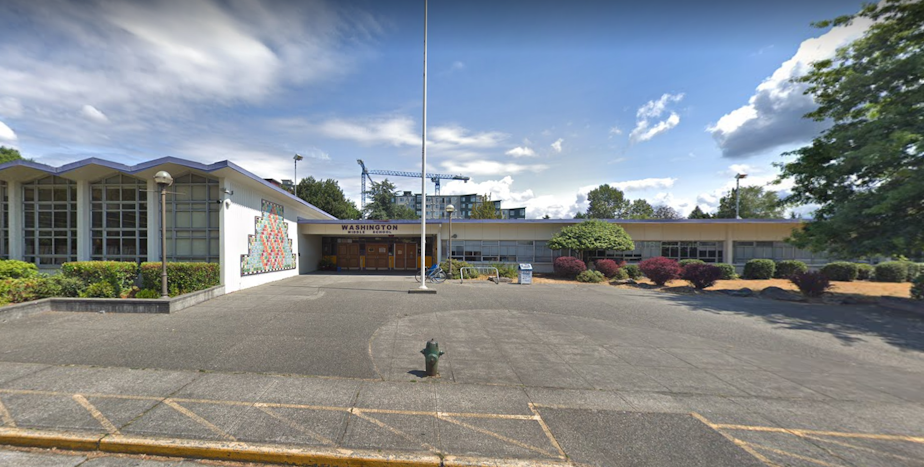Seattle Schools 'rethinking' teacher misconduct policies following KUOW classroom abuse investigation

Amid an ongoing KUOW investigation into Seattle Public Schools allowing abusive teachers to return to the classroom, district officials said they are revising teacher misconduct policies and reporting mechanisms.
But some question whether it’s enough.
District leaders presented their plans to improve the handling of teacher misconduct complaints to the Seattle School Board on Wednesday. They faced tough questions and criticism from school board members during the work session, which focused on human resources.
"Lots of issues have come to light over the last month that have caused us to rethink many of our practices," said Clover Codd, the district's chief human resources officer, while alluding to KUOW's classroom abuse investigation.
"One of them is that we have paper files on everybody — nothing's automated," she continued, saying that the district maintains a collection of paper personnel files that go back 20 to 30 years.
A third-party review of Seattle Public Schools’ Labor and Employee Relations Division last year found that the office's reliance on paper-based case management created "high levels of risk" for the district.
The report also called attention to a disjointed record-keeping system that makes it "challenging to track employee histories, creating the potential to relocate or rehire unsuitable employees."
READ: Seattle teacher abuse: What two school principals knew
Codd said that "it has not been [human resources'] practice to pass those [files] to the principal automatically" as they staff their schools. But Codd said that her department planned to start providing those records to principals upfront beginning this summer.
In an email sent to school principals February 7, Superintendent Juneau said the district’s human resources department was “working hard to better meet [principals’] needs in both hiring and employee relations.” She also said that she would “not look backward to what was done in the past to guide [her] decisions.”
The 2019 report, which was conducted by the Moss Adams consulting firm and commissioned by the district, also determined that a fragmented complaint intake system contributed to confusion and inefficiency when processing allegations.
Moreover, the assessment concluded that the human resources department was facing “barriers to working with a sense of urgency — even when the potential risks to students or the District are high.”
This issue was attributed to a lack of procedural support from leadership and haziness surrounding organizational roles. 22 total recommendations were suggested for improving the department's operations.
However, Misa Garmoe, the district's director of employee and union relations, pointed to what her department considers an improvement in recent years. She said that the number of employee misconduct investigations handled by her division had gone down from 456 cases to about 175 between 2017 and 2020 — a decrease of approximately 62%.
Additionally, the district recently created an email hotline for people to report teacher misconduct: employeemisconduct@seattleschools.org. But Seattle School Board Director Brandon Hersey balked at the idea of an email address being a sufficient reporting mechanism.
"We have to go beyond posters and email. That is not an acceptable answer for students and it will never be an acceptable answer," Hersey said, adding that "communities of color do not prefer to communicate via email."
Board directors also questioned the level of guidance school employees receive when it comes to the mandatory reporting of child abuse, as well as the consequences for not doing so.
When presented with an inquiry into how many district staff had been disciplined for failing to report abuse, Codd said she didn't have that data readily available.
"If we've got folks that are looking the other way, we really need to have a strong message that our children are going to be protected," replied Board Director Leslie Harris.
In January, Seattle Public Schools Superintendent Denise Juneau told district staff via email that she’d “charged Human Resources with improving processes and procedures that put student safety at the heart of all decision making” from the start of her employment with the district, which began in July 2018.
But James Johnson, a Seattle Public Schools math teacher who the district knew punched a student in the face and sexually harassed multiple female students, was allowed to return to the classroom on two occasions — the second of which occurred in 2019, under Juneau’s tenure.
Despite open knowledge about Johnson's history among district officials, human resources staff and several principals acted in concert to keep him working at various schools around the district.
READ: Seattle Schools knew these teachers abused kids — and let them keep teaching
In addition to digitizing personnel files and installing new misconduct reporting channels, Codd said the district was in the process of updating policies regarding pupil-teacher boundaries and sexual harassment. But she asserted that the district's safeguards would never completely eradicate instances of abuse toward students.
"We'll never get to perfect and we'll never be able to stop bad people from doing bad things to kids," Codd said. "But we're going to work like heck — to not just implement this plan — but there are other things that come up that we want to improve," Codd said.
"And we are all type-A, want to get to perfect. And that is our goal. We won't get there, but that's our goal."




